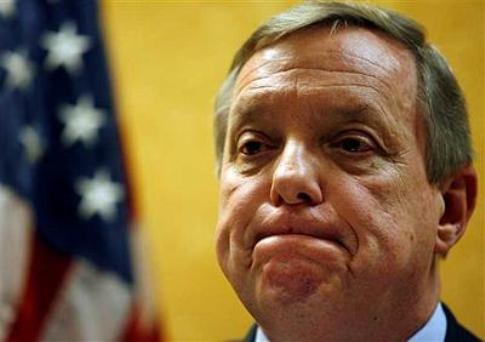
Most parties to the “fiscal cliff” negotiations employ a rhetorical veneer about the importance of compromise on both sides. They riff off Obama’s “balanced approach” talking point and stress that “everything is on the table.” Of course, it isn’t really true, but it’s what the media and pundits expect of “serious” people negotiating as adults. So, Dick Durbin at least scored some points for honesty when he sought to take entitlement spending off the “fiscal cliff” table.
Sen. Dick Durbin (D-Ill.), the Senate’s second-ranking Democrat, said Wednesday he is unwilling to place entitlement reforms on the table in the upcoming “fiscal cliff” negotiations.
Durbin said Congress would not have sufficient time to vet the long-term impact of changes to the programs and should hold off on making rushed decisions.
“Whatever changes we want to make should be thoughtful changes, not made in the heat of the fiscal cliff,” Durbin told CNN. “Not done in the closing days here, of a lame duck session. Let’s look at this thoughtfully and make sure at the end of the day Medicare is going to survive and be stronger.”
Now, around 2/3rds of all federal spending is on entitlements or interest on the debt. (Table 27-1) It is simply impossible to get our fiscal house in order unless entitlements are reformed. Entitlement spending now outpaces all federal revenue collections. This means that everything else government does, the national defense and all discretionary spending, has to be financed on borrowed dollars.
Even if Democrats got all the tax increases they want in these negotiations, the higher levies on the wealthy would only add around $100 billion a year to federal revenue. Unless entitlements are tackled, the entire “fiscal cliff” negotiations are just a media-fueled DC parlor game.
Durbin’s comments go a long way to show the disastrous opening-bid made by the GOP in these talks. Strategically, they ceded to the Democrats that government needed more revenue before any assurance that real spending cuts were on the table. Having won the debate over how to frame the negotiations, Durbin is now moving to take actual spending cuts off the table.
It is a totally unserious position, but Durbin can be confident that the media or pundits won’t call him out on it. He can also be confident that the GOP will continue to negotiate itself into a corner, which neither presents a coherent message to the American public nor achieves any chance for meaningful reform.

COMMENTS
Please let us know if you're having issues with commenting.